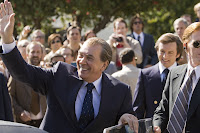 Everyone knows Richard Nixon for his extreme criminal act. He forever tainted the executive branch. Even every great president that succeeded him can’t clear the fact that a man like Nixon used his power for corrupt purposes. But the one thing people need to focus on more: his smugness. The day Nixon left the White House not a tear of sadness or any remorse seemed to hit his face, just a “I’m getting out of this clean” smile.
Everyone knows Richard Nixon for his extreme criminal act. He forever tainted the executive branch. Even every great president that succeeded him can’t clear the fact that a man like Nixon used his power for corrupt purposes. But the one thing people need to focus on more: his smugness. The day Nixon left the White House not a tear of sadness or any remorse seemed to hit his face, just a “I’m getting out of this clean” smile.
Of course, I wasn’t around to actually see this. I could only assume these things from photos taken and videos shot. The only way you could really decode that smug demeanor is by exploring his character and by, well, making a movie. Because that is what movies do best, capture someone’s inner workings and state of mind. All I can say is that what “Frost/Nixon” aimed to do, and succeeded at admirably.
Now, I’m probably going to spend a large portion of this review praising Frank Langella’s portrayal of Nixon and how spot on it was. But before I go onto that, it’s necessary to look at the movie itself, not just the person seen on screen.
As the title suggests, “Frost/Nixon” tells the story of Brit David Frost’s now legendary interview with post-resignation Richard Nixon. Frost is portrayed as Michael Sheen. Frost was not the world’s most highly respected journalist. He was a talk show host and an entertainer. No one knew going into it that Frost would be the man who broke Nixon down. But, he proved everyone wrong, and deserves to be mentioned amongst the hall of fame of journalists just for that.
“Frost/Nixon” itself is based on a play, using pretty much all the same actors the play had. I didn’t see the play so I can’t really compare the two. The only parts of the movie that really seem theatrical are the interviews themselves. Ron Howard decided to shoot the movie more in the style of a documentary rather than total traditional narrative form. He has characters doing interviews in the way future, and reflecting on the events. Unfortunately, having those interviews leaves less for the audience to discuss about Nixon (especially his facial expressions, more about that soon), but they do seem necessary in a movie that is documenting a behind the scenes look at how journalism works. Praise Howard for going beyond just recreation and actually exploring. You can watch the actual interviews to see what Nixon was really like, but you can see the movie if you really want to explore and understand how it all happened.
While watching “Frost/Nixon,” I was reminded of the other great movie about exposing Nixon, “All the President’s Men.” It is apparent that Howard studied that movie deeply. “Frost/Nixon” makes a great use of lighting and shadows to express mood and characters. Take for example the scene where Frost has a telephone conversation with Nixon, one that will set the course of the final interview. Frost, despite being extremely stressed, sits in a nicely lighted room. Nixon on the other hand, is shrouded in shadows, only a small portion of his face is visible. Truly menacing.
What this movie is really about is the fall of Richard Nixon. Had they not gotten a convincing actor to play Nixon, the movie probably wouldn’t have worked. But, they did the right thing and got Frank Langella. Langella gets his voice as close to Nixon’s as any human possibly could. Langella manages to use that voice, as well as his facial expressions, to actually become Nixon. Not at one point did I think I was looking at Frank Langella, but rather that someone had decided to pull a creepy Frankenstein like reincarnation of Nixon. He even walks (with that slightly hunched back) like Nixon.
Mostly Langella uses these characteristics to not just become Nixon, but to dig deeper and figure out his inner workings. You can’t become Nixon, but actors can study their character and just look at their face and find a way to crawl under their skin. It felt like Langella not only got under Nixon’s skin, but walked around in it, too. He captures that very arrogant, “I’m not guilty” vibe that Nixon always gave off. Even after being pressed by hard questions, he walked out with a pure smile as if nothing had happened. It was eerily similar to the recent trials of Rod Blagojevich and some of Bush’s final press conferences.
Langella not only captured his arrogance, but his very complex emotion as well. You could tell Nixon’s defeat after Frost’s final interview not just from his very slight tears, but when he went over and pet a dog’s head, and asked if it was a dachshund. You could see this man suddenly snap out of his feelings of king-like power, and realize his wrongdoing. He had officially become human.
The one scene of Langella’s portrayal of Nixon I will never forget is at one point when he makes some small talk with Frost before the interview begins. He asks, deadpan and without a smile about Frost’s night, “did you do any fornicating?” Langella never once snaps into a smile. This man was serious.
Movies can often transcend the idea of just merely being a piece of entertainment and become an encapsulation of history. The parallels you could find in this movie between Nixon’s resignation and the Frost interviews with the aforementioned Blagojevich impeachment and Bush press conferences, are undeniable. It is with this that “Frost/Nixon” fits the famous saying “those who don’t know history are condemned to repeat it.” “Frost/Nixon” makes its audience aware of its history, and then connects it to the present day. And it will do that, hopefully for generations to come.
 For the past few days, I’ve thought about writing a post in defense of Michael Phelps and the whole “I smoked marijuana once for God’s sakes I’m just a kid scandal.” Instead I’m just going to let Seth Meyers say everything I’ve been thinking. Meyers isn’t always the best actor, but when it comes to delivering punchlines, he does it like no other on “Saturday Night Live” today. His “Really?!?” segment on Weekend Update feels a little half-empty without Amy anymore, but last night, he still managed to deliver the goods. Mainly, by dissing out everyone making a fuss about those photos of Michael Phelps smoking a bong. There wasn’t enough anger toward Elisabeth Hasselback’s tirades against Phelps, but I digress. Meyers’s observations that Kellog, who recently dropped Phelps as a spokesperson, have the characters of a bunch of elves who live in trees and think of new things to put cheese on is like stoner heaven, was genius. But, Meyers deserved a standing ovation for this line:
For the past few days, I’ve thought about writing a post in defense of Michael Phelps and the whole “I smoked marijuana once for God’s sakes I’m just a kid scandal.” Instead I’m just going to let Seth Meyers say everything I’ve been thinking. Meyers isn’t always the best actor, but when it comes to delivering punchlines, he does it like no other on “Saturday Night Live” today. His “Really?!?” segment on Weekend Update feels a little half-empty without Amy anymore, but last night, he still managed to deliver the goods. Mainly, by dissing out everyone making a fuss about those photos of Michael Phelps smoking a bong. There wasn’t enough anger toward Elisabeth Hasselback’s tirades against Phelps, but I digress. Meyers’s observations that Kellog, who recently dropped Phelps as a spokesperson, have the characters of a bunch of elves who live in trees and think of new things to put cheese on is like stoner heaven, was genius. But, Meyers deserved a standing ovation for this line:
 Everyone knows Richard Nixon for his extreme criminal act. He forever tainted the executive branch. Even every great president that succeeded him can’t clear the fact that a man like Nixon used his power for corrupt purposes. But the one thing people need to focus on more: his smugness. The day Nixon left the White House not a tear of sadness or any remorse seemed to hit his face, just a “I’m getting out of this clean” smile.
Everyone knows Richard Nixon for his extreme criminal act. He forever tainted the executive branch. Even every great president that succeeded him can’t clear the fact that a man like Nixon used his power for corrupt purposes. But the one thing people need to focus on more: his smugness. The day Nixon left the White House not a tear of sadness or any remorse seemed to hit his face, just a “I’m getting out of this clean” smile.
 Last week, I announced plans of a remake to “Bonnie & Clyde” with Hilary Duff. Today, I am sad to announce that a remake is a go for the Paul Newman classic “Slap Shot.” “Slap Shot” was made in 1977, which is apparently too old for Hollywood. So far, the remake carries the writer of “Fun With Dick & Jane” and the director of “21″ and “Be Cool.”
Last week, I announced plans of a remake to “Bonnie & Clyde” with Hilary Duff. Today, I am sad to announce that a remake is a go for the Paul Newman classic “Slap Shot.” “Slap Shot” was made in 1977, which is apparently too old for Hollywood. So far, the remake carries the writer of “Fun With Dick & Jane” and the director of “21″ and “Be Cool.”
 “Milk” wasn’t the only movie Gus Van Sant put out this past year. Early on in 2008, he wrote and directed the little seen “Paranoid Park.” It is a slight masterwork of beautiful cinematography and scattered chronological storytelling.
“Milk” wasn’t the only movie Gus Van Sant put out this past year. Early on in 2008, he wrote and directed the little seen “Paranoid Park.” It is a slight masterwork of beautiful cinematography and scattered chronological storytelling.
